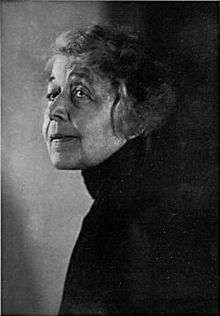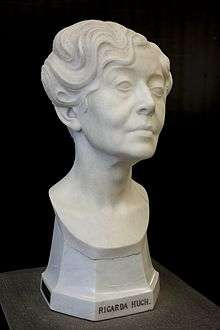Ricarda Huch

Ricarda Huch (German: [huχ]; July 18, 1864 – November 17, 1947) was a pioneering German intellectual. Trained as an historian, and the author of many works of European history, she also wrote novels, poems, and a play. Asteroid 879 Ricarda is named in her honour.
Life

Huch was born in Braunschweig and died in Schönberg in the Taunus (today, part of Kronberg). She was the daughter of Richard Huch, a wholesale merchant, and his wife Emilie (née Haehn). She also used the pseudonym Richard Hugo and published her first poems under the alias R. Ith Carda. She prepared for university work privately and studied in Zürich, where she received her doctorate in 1891. Her brother, Rudolf, and her cousins, Friedrich and Felix, were also well-known writers.
Huch studied philosophy, history and philology at Zürich University, as women were not then eligible for degrees at German universities. In 1890, she was one of the first women to attain a doctorate from Zurich with a dissertation on "The neutrality of the Confederation during the Spanish War of Succession" (Die Neutralität der Eidgenossenschaft während des spanischen Erbfolgekrieges). Shortly after attaining her doctorate, she published poetry under the alias of Richard Hugo. After working as a librarian, Huch left for Bremen, where she taught German and history. She later moved to Vienna and in 1898, she married Ermanno Ceconi, an Italian dentist. She moved to his Italian homeland of Trieste for several years, where they had a daughter, but they divorced in 1906. She later married her brother-in-law and cousin, the writer Richard Huch.
Huch was a member of the "Preußische Akademie der Künste", but resigned in 1933 when the National Socialists seized power and began purging the Academy. Huch left after Alfred Döblin quit. Despite her critical attitude to the new régime, Joseph Goebbels and Adolf Hitler sent her congratulatory telegrams on her 80th birthday. Huch dedicated much of her life to Italian, German and Russian history and historical novels that were psychological biographies. In 1947, she was an honorary president of the All-German Writers Congress in Berlin.
Perspectives
Thomas Mann called her "The First Lady of Germany".
Ricarda Huch was not well known in the English-speaking world until the Australian critic and man of letters Clive James devoted pp. 328–33 of his 2007 Cultural Amnesia: Necessary Memories from History and the Arts to her. He called her the First Lady of German humanism and as a bridging figure between Germaine de Stael and Germaine Greer. He reminds readers that she was educated at the University of Zurich, from which she was one of the first women to graduate, because in her day, German universities did not allow women to be candidates for degrees. He describes her gift for talking about the powerless as if they had the importance of the powerful, as shown in her book about the Thirty Years' War. According to James, when the Nazis came to power in 1933, they sought to recruit her into the party or at least “co-opt her prestige” but she declined to cooperate. She resigned as the first woman ever elected to the Prussian Academy of Arts and wrote to composer Max von Schillings, president of the Prussian Academy, asserting that the Nazi concept of Germanness (Deutschtum) was not her Germanness. She then retired to private life in Jena (she turned 69 in 1933), effectively going into internal exile.
After the war, Huch wrote as follows about the young men involved in the July 20 Plot against Hitler's life:
“To save Germany was not granted to them; only to die for it; luck was not with them, it was with Hitler. But they did not die in vain. Just as we need air if we are to breathe, and light if we are to see, so we need noble people if we are to live” (Ricarda Huch, "Für die Märtyrer der Freiheit," March/April 1946, cited in Briefe an die Freunde, p. 449, as quoted in James p. 329).
The Third Reich tacitly tolerated Huch's contempt for it as long as she was not too vocal about her opinions. James contrasts this silence with Huch’s younger, rebel years, when she intellectually admired Benito Mussolini's and Mikhail Bakunin’s anarchist origins. He describes how Huch stole her sister's husband and otherwise treated men and suitors in a manner that was stunning given her place and time. James believes this rebel attitude never died, as evidenced by the fact that she wrote with delight about the first air raid she experienced, in June 1943. Although 79 at the time, she enjoyed the destroyed buildings and rubble.
Books by Huch
- Erinnerungen von Ludolf Ursleu dem Jüngeren (1893)
- Fra Celeste (1899)
- Die Blütezeit der Romantik (1899)
- Ausbreitung und Verfall der Romantik (1902)
- Aus der Triumphgasse (1902)
- Vita somnium breve (1903. Title after 1913: Michael Unger)
- Von den Königen und der Krone (1904)
- Die Geschichten von Garibaldi (1906)
- Menschen und Schicksale aus dem Risorgimento (1908)
- Der letzte Sommer (epistolary novel, 1910)
- Das Leben des Grafen Federigo Confalonieri (1910)
- Der große Krieg in Deutschland. Three volumes (1912 - 1914)
- Natur und geist als die Wurzeln des Lebens und der Kunst (1914)
- Wallenstein (1915)
- Das Judengrab (1916)
- Luthers Glaube (1916)
- Der Fall Deruga (courtroom drama, 1917)
- Der Sinn der Heiligen Schrift (1919)
- Michael Bakunin und die Anarchie (1923)
- Im alten Reich (1927)
- Gesammelte Gedichte (1929)
- Deutsche Geschichte (1934–1949)
- Frühling in der Schweiz, Jugenderinnerungen (1938)
- Herbstfeuer (1944)
- Urphänomene (1946)
References
-
 This article incorporates text from a publication now in the public domain: Gilman, D. C.; Thurston, H. T.; Colby, F. M., eds. (1905). "article name needed". New International Encyclopedia (1st ed.). New York: Dodd, Mead.
This article incorporates text from a publication now in the public domain: Gilman, D. C.; Thurston, H. T.; Colby, F. M., eds. (1905). "article name needed". New International Encyclopedia (1st ed.). New York: Dodd, Mead. - Benet's Reader's Encyclopedia. Third edition. New York: Harper & Row, 1987.
- Benet's Reader's Encyclopedia. Fourth edition. Edited by Bruce Murphy. New York: Harper Collins Publishers, 1996.
- Biography and Genealogy Master Index. Farmington Hills, Mich.: Thomson Gale, 1980- 2007
- The Bloomsbury Guide to Women's Literature. Edited by Claire Buck. New York: Prentice Hall General Reference, 1992. Biographies begin on page 247.
- Chambers Biographical Dictionary. Sixth edition. Edited by Melanie Parry. New York: Larousse Kingfisher Chambers, 1997.
- Contemporary Authors. A bio-bibliographical guide to current writers in fiction, general nonfiction, poetry, journalism, drama, motion pictures, television, and other fields. Volume 111. Detroit: Gale Research, 1984.
- The Continuum Dictionary of Women's Biography. Second edition. Edited by Jennifer S. Uglow. New York: Continuum Publishing, 1989. First edition published as The International Dictionary of Women's Biography.
- Dictionary of Literary Biography. Volume 66: German Fiction Writers, 1885-1913. Two parts. Edited by James Hardin. Detroit: Gale Research, 1988. Biography contains portrait.
- Encyclopedia of Continental Women Writers. Two volumes. Edited by Katharina M. Wilson. New York: Garland Publishing, 1991.
- Encyclopedia of the Third Reich. By Louis L. Snyder. New York: McGraw-Hill, 1976.
- The Encyclopedia of the Third Reich. Two volumes. Edited by Christian Zentner and Friedemann Bedurftig. Translation edited by Amy Hackett. New York: Macmillan Publishing Co., 1991. Biography contains portrait.
- Encyclopedia of World Biography. Second edition. Seventeen volumes. Detroit: Gale Research, 1998. First edition published as The McGraw-Hill Encyclopedia of World Biography with six supplement volumes published as Encyclopedia of World Biography: 20th Century Supplement . Biography contains portrait.
- Encyclopedia of World Literature in the 20th Century. Revised edition. Four volumes. Edited by Leonard S. Klein. New York: Frederick Ungar Publishing Co., 1981-1984. Gale Research, Detroit. Biography contains portrait.
- Encyclopedia of World Literature in the 20th Century. Third edition. Four volumes. Detroit: St. James Press, 1999.
- The Houghton Mifflin Dictionary of Biography. Boston: Houghton Mifflin, 2003.
- Index to Women of the World from Ancient to Modern Times. Biographies and portraits. By Norma Olin Ireland. Westwood, MA: F.W. Faxon Co., 1970.
- Index to Women of the World from Ancient to Modern Times: A Supplement. By Norma Olin Ireland. Metuchen, NJ: Scarecrow Press, 1988.
- The International Dictionary of Women's Biography. First edition. Compiled and edited by Jennifer S. Uglow. New York: Continuum Publishing, 1982. Later edition published as The Continuum Dictionary of Women's Biography.
- The Lincoln Library of Language Arts. Third edition. Two volumes. Columbus, OH: Frontier Press Co., 1978. Biographies begin on page 345 of Volume 1 and are continued in Volume 2.
- The McGraw-Hill Encyclopedia of World Biography. New York: McGraw-Hill, 1973. Supplemental volumes published as Encyclopedia of World Biography: 20th Century Supplement.
- Modern Women Writers. Four volumes. Compiled and edited by Lillian S. Robinson. New York: Continuum Publishing, 1996.
- The Oxford Companion to German Literature. Second edition. By Mary Garland. Oxford, England: Oxford University Press, 1986.
- The Oxford Companion to German Literature. Third edition. By Mary Garland. Oxford, England: Oxford University Press, 1997.
- The Penguin International Dictionary of Contemporary Biography from 1900 to the Present. Second edition. By Edward Vernoff and Rima Shore. New York: Viking Penguin, 2001. First edition published by New American Library as The International Dictionary of 20th Century Biography.
The Riverside Dictionary of Biography. Boston: Houghton Mifflin, 2005.
- Twentieth-Century Literary Criticism. Excerpts from criticism of the works of novelists, poets, playwrights, short story writers, and other creative writers who died between 1900 and 1960, from the first published critical appraisals to current evaluations. Volume 13. Detroit: Gale Research, 1984. Biography contains portrait.
- Women in World History. A biographical encyclopedia. Seventeen volumes. Waterford, CT: Yorkin Publications, 1999-2002. Use the Index in vol. 17 to locate biographies. Biography contains portrait.
Further reading
- E. A. Regener (1904) Ricarda Huch, eine Studie. Leipzig.
- Elfriede Gottlieb (1914) Ricarda Huch, ein Beitrag zur Geschichte der deutschen Epik.
External links
-
 Media related to Ricarda Huch at Wikimedia Commons
Media related to Ricarda Huch at Wikimedia Commons - Works by Ricarda Huch at Project Gutenberg
- Works by or about Ricarda Huch at Internet Archive